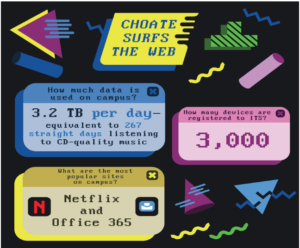Wi-Fi and cellular networks are now an integral part of our everyday lives. Students rely on these networks because they rely on smartphones, laptops, and iPads. Choate students often express their opinions and voice their complaints about these services. This contentious issue seems to have two major components: Wi-Fi speeds on campus and Wi-Fi shut-off times.
Wi-Fi speed is measured through both download speed and upload speed. Download speed is the speed at which data is sent from internet to your device, while the upload speed is the speed at which data is sent from your device to the Internet. At Choate, there are often rumors and theories about which network,CRH, Choate, or Choate Guest, is the fastest. Mr. Andrew Speyer, Director of Information Technology Services (ITS), put these rumors to rest.
“CRH and Choate are both connected to the same network,” he said. “The only thing that is different about them is that they have different network authentication. CRH is the newer network that we launched this summer, and it uses 802.1X which allows you to login to the network using only a username and password. Choate is the older network, and it used an older network authentication that required a long set of steps that was simply outdated. The only reason we have not completely gotten rid of Choate yet is that some android devices are having troubles with connecting to CRH.”
Olly Copplestone ’21, who owns an Android, said, “There are some difficulties in connecting to CRH on my phone; however, I just use Choate and honestly I notice no difference between the two when I switch between them on my iPad.”
Both CRH and Choate are part of Connecticut Education Network (CEN), a service provided by the state government that ensures reliable, high-speed internet to its members. Choate is among 100 other institutions, both public and private, to use this service, whose goal is to provide an equitable platform for education in terms of technology.
The CEN allows for the Choate and CRH networks to operate at a 1 GB download speed, which is very fast, compared to the miniscule 100 MB to 200 MB download speed of Choate Guest. Less than ten percent of the state has access to download speeds of 1 GB, according to InMyArea.com, a website that compares and sells different Wi-Fi and cellular plans and their speeds. Mr. Speyer said, “Choate Guest is completely different than the other two networks: it is not part of the CEN and is a Wallingford Comcast Network. What this means is that it is part of the municipal Wi-Fi system and operates at the same speed of a typical residential household in Wallingford. This is why the network is supposed to be used for guests, not students trying to access the internet at 2:00 a.m.” This seems to be one of the only times students try to use the guest network, when they are trying to work around the Wi-Fi shut off.
This leads to another section of the Wi-Fi debate: the current administration’s regulation of Wi-Fi in each form. There was a range of student opinion on this issue, with different proposals for change to the current set of regulations. The most popular opinion among both sophomores and juniors is that after freshman year, sophomores should have Wi-Fi until midnight and juniors should have unlimited Wi-Fi. Ahmed Wise ’20 voiced the main justification for this argument . He said, “A lot of people already don’t follow the rules, by using VPN’s or Personal Hotspots or just using Choate Guest, so why doesn’t the school just make it equal for everyone by extending the Wi-Fi for everyone?”
Charlie Schoninger ’20 argued the opposite view. “I think most people that want to work after the Wi-Fi shuts off can use Personal Hotspots and VPN’s,” he said. “However, if the school extends Wi-Fi, people will struggle more to go to sleep and maintain their self-control.”
The rules aren’t determined solely by ITS. Mr. Speyer said, “I don’t make policy, I just follow it. However, I would like to point out that students should not be using Choate Guest at all, especially to bypass the network shutting down.”
Mr. Speyer went on, “We have done a lot to combat the problem of students accessing Choate Guest at night. We have taken away the guest login, changed the layers of security, and I have sent out many nasty emails to students at 2:00 a.m. in the morning.”
Choate sits in a valley between two hills, one marked by Hill House, the other by the cross country course, so the school has long had below-average cellular service. Furthermore, many of the cell towers from the major cell providers are far in town, with Verizon’s near Vinny’s Deli on Christian St. Many campus buildings, including Bernhard, Tenney, and the Lanphier Center, often have limited or no service.
Isabelle So ’20, who lives in Bernhard House, said, “The first floor of SoHo is the one that has the major cell service issues. Because it’s kind of built into the side of the hill, it is basically like a basement and gets no cell service. I personally have AT&T and sometimes I can get one bar on the second floor, but most of the time people with Verizon get no service.”
So also reflected on how this could be a problem for members of the dorm in terms of getting work done on time: “I know that now as juniors, we stay up until midnight before the Wi-Fi shuts off, but because we are so busy with work and other commitments, it’s often hard for us to get all of it done. Like on Thursdays I have swim practice until 7:30 p.m., which gives me no time to start work.”
Many students seem to echo these sentiments. Aidan Marzeotti ’20 argued, “I think that the school Wi-Fi is fine, but I really think that the school shutting it off for juniors at midnight is unwarranted. I think they should understand the amount of work we have and the amount of time we have to do that work. I understand that they are concerned about our health and our sleep, but some people with access to VPN and cellular data are already bypassing that. I think we should level the playing field.”



